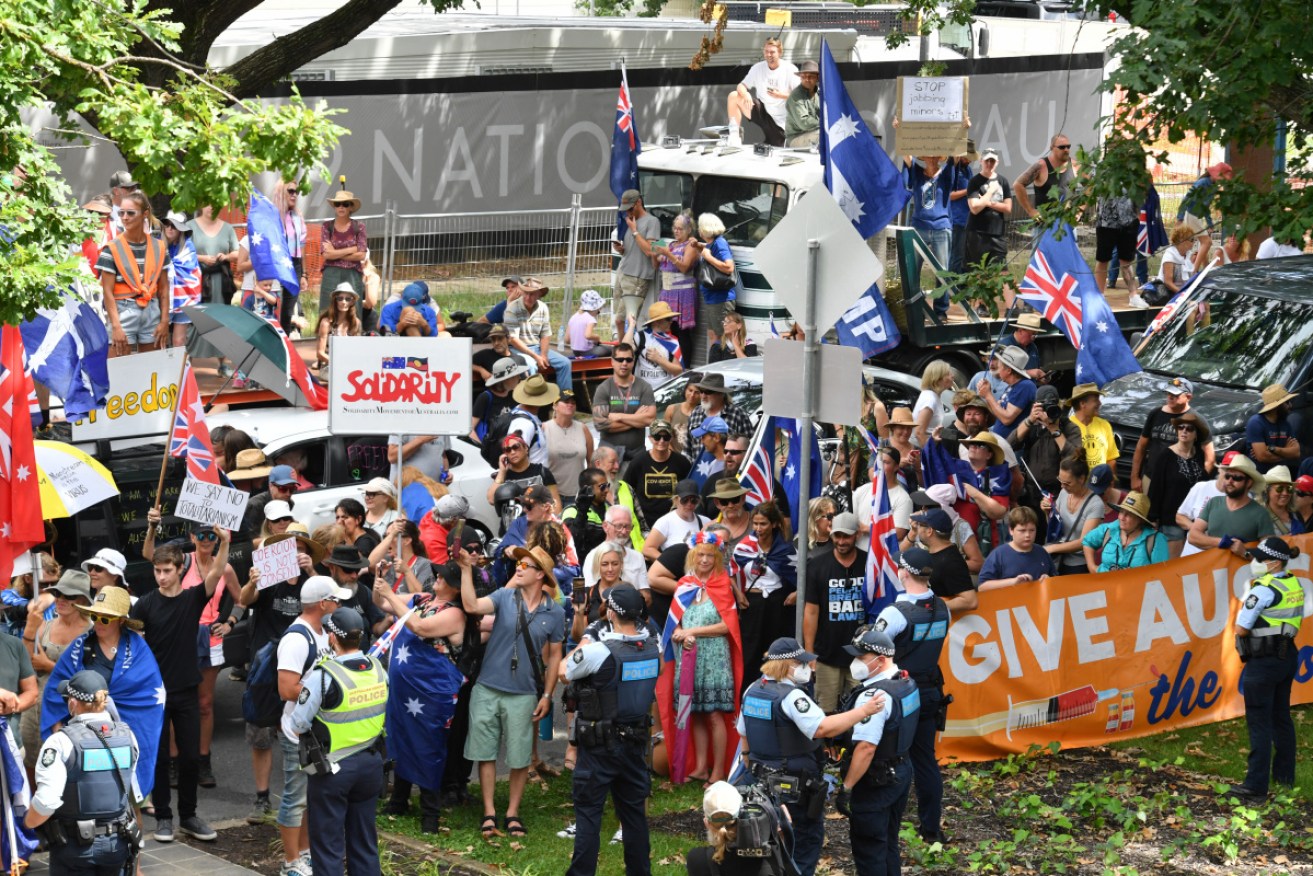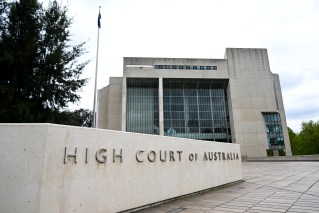Anti-vax doctors and nurses take to the streets as pandemic protests roll on


Anti-mandate protests have outlived many COVID mandates. Photo: AAP
Harsh COVID-19 lockdowns may be a thing of the past, but protests continue.
In Melbourne last Saturday, there was a rally of mainly medical professionals forced out of work due to vaccine mandates.
No one group claimed credit for organising the protest, but a number attending the rally identified with the Australian Medical Professionals Society, which supports unvaccinated doctors and nurses unable to work because of vaccine mandates.
‘‘We are also standing up for the right of practitioners to have an open and respectful scientific discourse in medicine about all aspects of our pandemic public health response,’’ she said.
The protest came days after Victoria scrapped several COVID mandates, including third-dose requirements for workers across several sectors, apart from health and emergency services.
Onlookers expressed confusion about the recent protest.
Tweet from @JaiEdwards17
Jolanda Jetten, professor of social psychology at the University of Queensland, said the diversity of motivations for protests in 2020 and 2021 made it hard to understand why protests were still being held.
Original protests attracted Australians who held anti-vaccine sentiments before COVID hit; some who held strong anti-government views and disliked being told what to do; some who believed in conspiracy theories, and others unhappy about lockdowns and restrictions.
Dr Jetten said protesters felt empowered to continue because of the media attention they received during the first two years of the pandemic. But it was a catch-22; when no mainstream media reported on their demonstrations, protesters saw this as proof of prejudice.
‘‘There is quite a strong conspiracy bias underlying all of it,” she said.
Far-right researcher Kaz Ross said the growth and sustained support of the local anti-vaccine movement also came courtesy of a similar, more cashed-up version in the US.
‘‘In places like Victoria, [where people] suffered very badly during the pandemic lockdowns … they’ve just got a big sense of grievance, that they’ve been harmed, that they are due reparation, that their lives were wrecked in one way or another,’’ Dr Ross said.
‘‘Therefore, they’ve got this momentum to meet every week and walk around the streets and shout at empty buildings and basically become public pests.’’
Tweet from @Odeila21
Call to query anti-vax medics
Catherine Bennett, Deakin University chair in epidemiology, said while the small-but-vocal anti-vaccine group of medical professionals in Australia said it was open to debate, that was not her experience.
‘‘One day I skimmed through an [anti-vaccine medical] conference that had speaker after speaker, and it was really shocking to me that these people could stand at a conference, and no one questioned them,’’ Dr Bennett said.
‘‘They were misinterpreting data, they were making silly, really basic assumptions about associations; it was the sort of thing you would show as a joke to first-year students, honestly.’’
Dr Bennett said a lot of people used the lack of restrictions now as proof that earlier mandates weren’t necessary. But she said the country had reached this point only thanks to earlier action.
‘‘They’re looking at the product of the vaccination program, and trying to use it as an argument to not have a vaccination program,’’ she said.
‘‘They form a bubble, they reinforce their own beliefs within the bubble, and a few people outside the bubble get drawn into it.
‘‘That’s probably less risky to the wider community now that individual decisions about vaccines and things aren’t what they were six months ago. But it did damage then, and they’re still doing damage now.’’
Protest stars set sights on political careers
Some of the people at the forefront of the anti-vax movement, such as former My Kitchen Rules judge Pete Evans, tried to use the opportunity to line their pockets by spruiking alternatives to mainstream medicine, but they didn’t have much success, Dr Bennett said.
Others are working to transform large followings into political clout. They include the United Australia Party’s Ralph Babet, who posted about his anti-lockdown views and electoral fraud theories before scoring a Senate seat in the last federal election.
Another prominent protester trying to break into politics is Morgan Jonas, who rose to prominence as an anti-lockdown and anti-vaccine mandate campaigner throughout 2021.
Mr Jonas will run for in the south-eastern metropolitan region for Victoria’s upper house in the upcoming state election as a member of the new Freedom Party of Victoria.
More ‘freedom’ rallies are expected in Melbourne throughout September.








